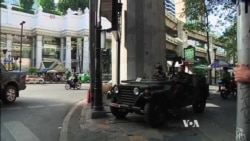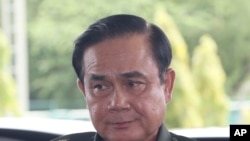BANGKOK —
Thailand's military says martial law will stay in place until peace and order are restored, following months of sometimes deadly anti-government protests.
Army chief General Prayuth Chan-Ocha went on television Tuesday, saying he declared martial law to end the political stalemate and prevent violence after the country's top court ousted Prime Minister Yingluck Shinawatra for abuse of power.
Thailand's interim Prime Minister Niwattamrong Boongsongpaisan says he plans to speak with the army general who declared martial law. In the meantime, he has issued a plea for the military to act peacefully and within the bounds of the constitution.
Foreign Ministry spokesman Sek Wannamethee says the army has assured ministers of the caretaker Cabinet that the government is still fully functioning under the current constitution.
"The martial law is to maintain peace and order, for us government agencies to resume our work in an effective manner to serve the public and to ensure that the general public can lead their normal activities in Bangkok and across the nation," said Sek.
But sources in the government, who do not want to be identified, tell VOA News the military decrees have essentially rendered the civilian government impotent and its leaders find themselves kowtowing to the powerful army command.
The army chief, General Prayuth Chan-ocha, says he declared martial law in a bid to end the country’s drawn-out political stalemate and prevent violence between pro- and anti-government supporters.
Asked by reporters if the military's action is a prelude to a coup, the general responded that is a question “no one is going to answer” and no assumptions should be made.
‘De facto coup’
Under the martial law order, no marches are allowed by demonstrators. The organizers of rival protest movements say they will continue their rallies at fixed spots.
Former deputy prime minister Suthep Thaugsuban has led six months of anti-government protests. After martial law was imposed, he told his followers their demonstration will continue.
Suthep said despite martial law the constitution still exists, as does the right to rally peacefully without weapons to stand up and oust the government.
Throughout the day the military issued numerous orders subsequent to the martial law decree. They include shutting down a number of television and radio stations and warning that anyone using social media to incite unrest would face consequences. Its ninth order of the day then insisted there be no discussion about the imposition of martial law “in all formats.”
Amnesty International issued a statement saying the army's restrictions on freedom of expression and peaceful assembly violate Thailand’s obligations under international human rights law.
Another global non-governmental organization, Human Rights Watch, characterizes the declaration of martial law as a “de facto coup.” It is calling for the United States and others to demand power be returned immediately to the civilian government.
The U.S. State Department is calling on the Thai Army to honor its pledge to "make this a temporary action to prevent violence, and to not undermine democratic institutions."
Thailand's constitutional court recently issued an abuse of power ruling that led to the resignation of interim prime minister Yingluck Shinawatra. She was replaced by her commerce minister, Niwattamrong.
Thailand has faced 18 coups or coup attempts since the early 1930's. The last one, in 2006, resulted in the overthrow of former prime minister Thaksin Shinawatra, Yingluck's brother. His opponents contend Thaksin is essentially still running the government while in self-imposed exile.
Army chief General Prayuth Chan-Ocha went on television Tuesday, saying he declared martial law to end the political stalemate and prevent violence after the country's top court ousted Prime Minister Yingluck Shinawatra for abuse of power.
Thailand's interim Prime Minister Niwattamrong Boongsongpaisan says he plans to speak with the army general who declared martial law. In the meantime, he has issued a plea for the military to act peacefully and within the bounds of the constitution.
Foreign Ministry spokesman Sek Wannamethee says the army has assured ministers of the caretaker Cabinet that the government is still fully functioning under the current constitution.
"The martial law is to maintain peace and order, for us government agencies to resume our work in an effective manner to serve the public and to ensure that the general public can lead their normal activities in Bangkok and across the nation," said Sek.
But sources in the government, who do not want to be identified, tell VOA News the military decrees have essentially rendered the civilian government impotent and its leaders find themselves kowtowing to the powerful army command.
The army chief, General Prayuth Chan-ocha, says he declared martial law in a bid to end the country’s drawn-out political stalemate and prevent violence between pro- and anti-government supporters.
Asked by reporters if the military's action is a prelude to a coup, the general responded that is a question “no one is going to answer” and no assumptions should be made.
‘De facto coup’
Under the martial law order, no marches are allowed by demonstrators. The organizers of rival protest movements say they will continue their rallies at fixed spots.
Former deputy prime minister Suthep Thaugsuban has led six months of anti-government protests. After martial law was imposed, he told his followers their demonstration will continue.
Suthep said despite martial law the constitution still exists, as does the right to rally peacefully without weapons to stand up and oust the government.
Throughout the day the military issued numerous orders subsequent to the martial law decree. They include shutting down a number of television and radio stations and warning that anyone using social media to incite unrest would face consequences. Its ninth order of the day then insisted there be no discussion about the imposition of martial law “in all formats.”
Amnesty International issued a statement saying the army's restrictions on freedom of expression and peaceful assembly violate Thailand’s obligations under international human rights law.
Another global non-governmental organization, Human Rights Watch, characterizes the declaration of martial law as a “de facto coup.” It is calling for the United States and others to demand power be returned immediately to the civilian government.
The U.S. State Department is calling on the Thai Army to honor its pledge to "make this a temporary action to prevent violence, and to not undermine democratic institutions."
Thailand's constitutional court recently issued an abuse of power ruling that led to the resignation of interim prime minister Yingluck Shinawatra. She was replaced by her commerce minister, Niwattamrong.
Thailand has faced 18 coups or coup attempts since the early 1930's. The last one, in 2006, resulted in the overthrow of former prime minister Thaksin Shinawatra, Yingluck's brother. His opponents contend Thaksin is essentially still running the government while in self-imposed exile.












